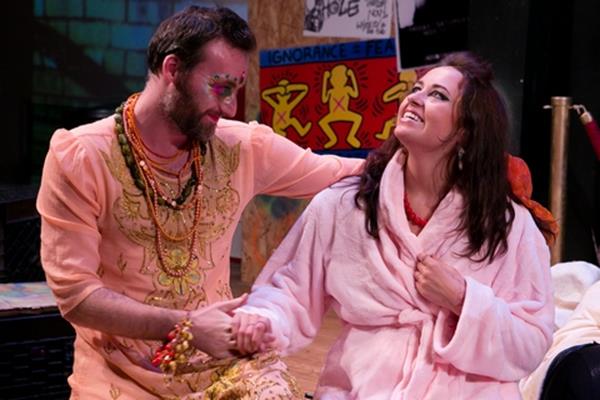Back
Experimental play celebrating Greenwich Village history and debauchery inspires little more than confusion.

Matthew Dalton Lynch and Olivia Nice in a scene from “Back” (Photo credit: Hunter Canning)
Though I was not alive to witness the cacophonous era firsthand, I do not doubt 1980’s Greenwich Village was an endlessly fascinating cultural moment. On the one hand, bohemians and free spirits provided the downtown neighborhood with a vibrant, unique culture; on the other, disease ravaged the streets. The AIDS epidemic that struck New York City sparked an array of seminal works on loss, grief, and action in the face of tragedy: Angels in America, Rent, The Normal Heart, et al. Unfortunately, Back, the newest edition to this canon, fails to spark little more than confusion. In lieu of literary prowess, this bizarre, ensemble-based show produced by Poetic Theater Productions at the cell relies solely on shock value.
Set in at ill-defined Halloween party raging somewhere in the universe between life and death, Back depicts numerous formerly living Greenwich Village icons, from founding father Alexander Hamilton to Flower Power movement leader George Harris, III. Cookie Mueller—writer, muse to the famous filmmaker John Waters, and AIDS victim—leads the proceedings as this scripted Pride Parade’s grand marshal. Filled with recurring mantras, bizarre non sequiturs, and gratuitous nudity, the performance under review (the rotating script allows for different variations at different performances) followed—or, more appropriately—circled around the respective, untimely demise of both poet Frank O’Hara and actress Mueller.
Back is the brainchild of writer Mickey Bolmer and director Andrew Willis-Woodward; while their hearts are in the right place, their execution falls short. As described on their website, Poetic Theater aims to foster writers who are “passionately creating relevant and accessible work and reinvigorating a conscious theater of language.” While Bolmer’s subject matter—the enduring effects of disease, bigotry, and general adversity on homosexual life in America—remains relevant, his dense, poetic language is far from accessible. Be advised: full appreciation of this work requires a firm understanding of New York City history, a healthy working knowledge of Aeschylus’ Oresteia, and the ability to wade through thick literary clutter. Even for people who fulfill these prerequisites, the returns are still diminishing.
In an attempt to create an immersive theatergoing experience, the actors break the imaginary fourth wall, cajole audience members into wearing one of costume designer Arielle Avenia’s Halloween pieces, and go so far as to violate our personal space boundaries. During one of the more cringeworthy points in the performance I attended, every single cast member ritually kissed a cooperative, but nevertheless uncomfortable, man seated in the first row. The proceedings are visceral, tribal and—in direct contrast to the artistic and forward-thinking community we know Greenwich Village to be—embarrassingly animalistic.
Despite the text’s woeful shortcomings, the young ensemble of eight nobly commits to their bohemian alter egos with admirable abandon. Behind Olivia Nice’s expressive eyes is a vibrant, tortured Cookie Mueller facing her imminent death while still teeming with life. It is a shame that the creative team provides more information about this fascinating historical figure in the program notes than in the actual script. Adam Wennick’s Frank O’Hara is similarly intriguing; he inhabits the poet’s being with a mysterious, brooding poise. Unfortunately, the cast’s strong performances across the board fail to mask the text’s flaws and instead further highlight the creative team’s follies.
It is worth noting that all patrons are entitled to a free beer with admission; however, complimentary alcohol may not be enough to salvage this evening out. Truth be told, I am not entirely sure what I witnessed at the cell, but suffice it to say I will not be going Back.
Back (through October 31, 2014)
Poetic Theater Productions
the cell, 338 West 23rd Street, in Manhattan
For tickets, call 866-811-4111 or visit http://www.poetictheater.com
Running time: two hours including one intermission
Experimental play celebrating Greenwich Village history and debauchery inspires little more than confusion.






Leave a comment